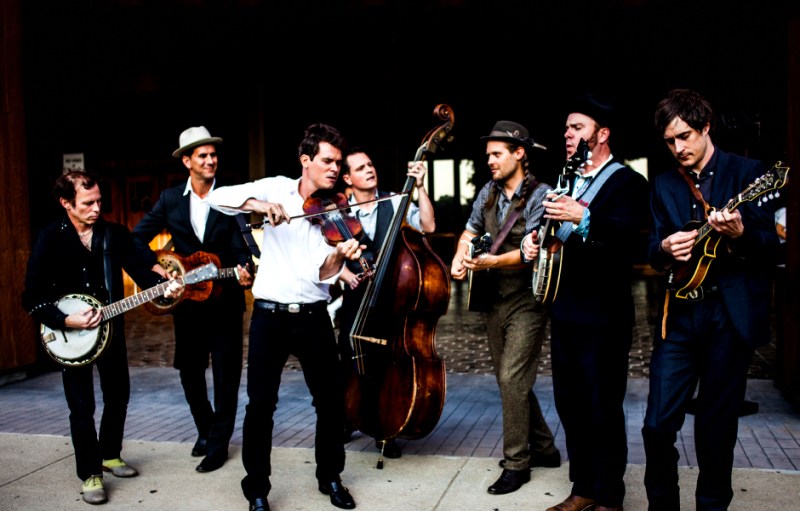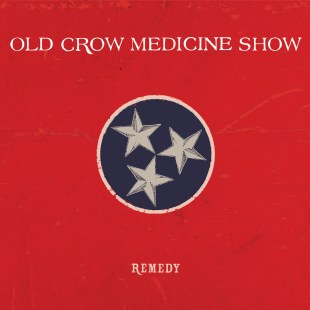
Somebody’s child cries in the background while Ketch Secor chooses his words, which may explain the metaphor Old Crow Medicine Show’s co-founder borrows to explain the third track on their newest album, Remedy. “Bob called,” Ketch says with dry understatement. “Left a song at the doorstep in a little Moses bassinet.” Bob called. Bob Dylan.
He didn’t actually call. That would be too much. Dylan’s management company e-mailed a song fragment from Dylan’s 1973 Pat Garrett & Bill the Kid outtakes, the same sessions from which Ketch and his mates borrowed and expanded and ultimately co-wrote “Wagon Wheel.” That turned out pretty well for everybody involved, the single certified platinum by the RIAA, most of those spins and downloads accomplished even before Darius Rucker took the song to the top of the country charts. A standard now, a parking lot song.
Only this time Dylan’s song fragment — “Sweet Amarillo” — came with something like a manual. “In a kind of hands-off way he told us how he wanted us to do it,” Ketch says. “Told us the chorus needs to come in at the sixteenth bar, to play the fiddle, not the harmonica.”
“Sweet Amarillo” might not even be the best song on Remedy, scheduled for a July 1 release on ATO. There might not be a best song.
Secor’s own “Dearly Departed Friend,” a comrade’s homage to a soldier who could not survive the peace back home…that might be the best. Or Critter Fuqua’s down and out co- write, “Firewater,” maybe that one. Or “The Warden,” co-written by banjo player Gill Landry and Felix Hatfield, a striking prison portrait which book-ends the album with Secor’s rollicking “Brushy Mountain Conjugal Trailer.”
It’s all good.
Fifteen years into their career, Remedy may well be Old Crow Medicine Show’s finest album to date. It reunites them with producer Ted Hutt (Flogging Molly, Dropkick Murphys, Gaslight Anthem), who also directed traffic on Carry Me Back. “Everything kinda clicked for this record,” Critter Fuqua says. “It was a real collaborative effort. I’ve never had such a good time writing, making demos…the whole process.” He’s not just saying that. It shows. Or, as the old record men used to say, it’s in the grooves.
These last few years have been filled with miracles and accolades, beginning with co-founder Critter Fuqua’s return to the band after a five-year hiatus. A film documenting the 2011 Railroad Revival Tour (with Edward Sharpe and the Magnetic Zeroes and Mumford & Sons) won the 2013 Grammy Award for Best Long Form Music Video.
As it worked out, 2013 was also the year Old Crow Medicine Show became members of the Grand Ole Opry. Not itinerant musicians busking outside, hoping to get noticed before they got busted. Members. On the big stage.
On ever bigger stages, the kind of slow, organic growth managers and labels always hope for and rarely have the patience to nurture. Headliners where once they opened. On any stage Old Crow still play with the hunger and ferocity of scruffy kids watching coins fall in the guitar case. Except they’ve accumulated technique and grooming tips since they began making music on street corners in upstate New York, Canada, and down into Boone, North Carolina, where they were discovered by Doc Watson. Another new song, “Doc’s Day,” is what Critter calls “historical fiction” honoring those days. “We played on King Street. We didn’t have amps or guitars. There were definitely some hillbillies that loved to flatfoot.”
Among the first of their generation to come to old time string music, Old Crow were as rough as green lumber in those early days. As they should have been. “None of us grew up playing this music,” Critter says. “We all grew up playing Nirvana and electric guitars.” “It was raw for a couple reasons,” Ketch says. “It was raw because the source of inspiration was all of the earliest recordings of country music, blues music, race and hillbilly. And that stuff is the raw form. It’s dirty. That’s the greasy stuff. That’s what we were cloaking ourselves with.”
That folk tradition resonates throughout Remedy. “Tennessee Bound” extends a song from Lily Mae Ledford, the Kentucky banjo player principally associated with the Coon Creek Girls. “Sweet Home” recasts a melody originally recorded by the Skillet Lickers.
It is those deep roots which make Old Crow Medicine Show’s audience dance and sing. Traditionalists, new and old. Blue collar, white collar, no collar. Doesn’t matter. It doesn’t matter because Old Crow Medicine Show is a vital, diverse ensemble. A living cloud of joy. Songs come from anywhere, filtered through the band’s streetcorner savvy. But at the center of things remains the long-running creative partnership of Ketch Secor and Critter Fuqua. “Critter and I started writing songs when we were thirteen,” Ketch says. “At a really young age Critter was a phenomenal musician, really innate. Actually, it feels like I’m fourteen when we hang out. It’s been such a full wind in our sails to have Critter back.”
The medicine show tradition was all a hustle, musicians (or worse) trotted out to draw an audience so the smart guy could step onstage and sell bottles filled with a remedy for whatever ailed. The smart guy was wrong, even if he made most of the money.
The medicine show was the remedy. The music. People came for the music, and the unexpected joy it brought healed them.
The power of a melody, a smile, and a beat that makes young folk dance before they even know what they’re doing. That’s still what music is, the music that matters: A remedy for what ails us.
Even if your name is Bob.
Order Remedy over on iTunes, Amazon, or from the band’s official website!



